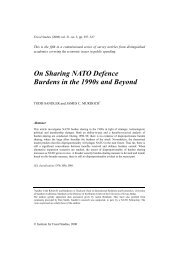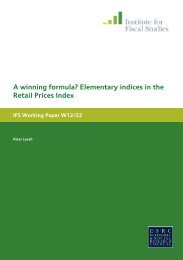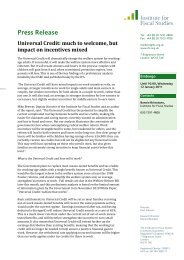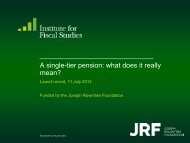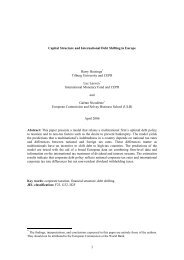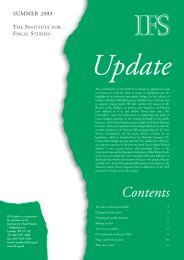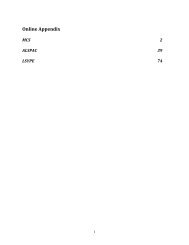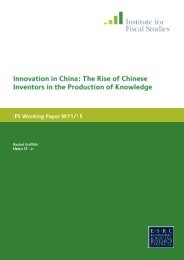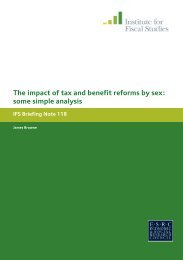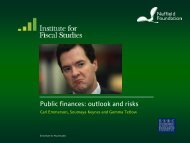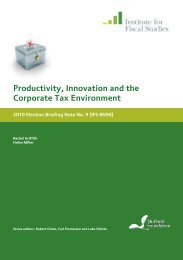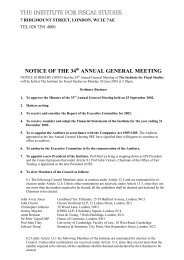A single-tier pension: what does it really mean? - The Institute For ...
A single-tier pension: what does it really mean? - The Institute For ...
A single-tier pension: what does it really mean? - The Institute For ...
Create successful ePaper yourself
Turn your PDF publications into a flip-book with our unique Google optimized e-Paper software.
A <strong>single</strong>-<strong>tier</strong> <strong>pension</strong>: <strong>what</strong> <strong>does</strong> <strong>it</strong> <strong>really</strong> <strong>mean</strong>?<br />
from the proposed reform over the whole of their life beyond SPA. Only 2%<br />
would lose; this is confined to those w<strong>it</strong>h fewer than 10 years of contributions<br />
and those who lose out from the abol<strong>it</strong>ion of derived <strong>pension</strong>s based on a<br />
partner’s contribution record.<br />
• However, some gains in state <strong>pension</strong> income will be offset by reductions in<br />
<strong>mean</strong>s-tested benef<strong>it</strong> ent<strong>it</strong>lements, including those arising from the abol<strong>it</strong>ion<br />
of the <strong>pension</strong> cred<strong>it</strong> savings cred<strong>it</strong>. While 64% of individuals in the lowest<br />
wealth quintile would receive higher <strong>pension</strong> income as a result of the<br />
reforms, only 40% of them would find that their household’s net income<br />
would be higher after taking into account reductions in <strong>mean</strong>s-tested <strong>pension</strong><br />
cred<strong>it</strong>.<br />
Long-run effect of the proposed reforms<br />
In the longer term, the new system will be less generous to just about everyone<br />
than the system that <strong>it</strong> is replacing. This certainly includes anyone born in 1986<br />
or later and potentially includes cohorts born as early as 1966. That is because<br />
the accrual rate will be lower than the combined accrual rate of the basic state<br />
<strong>pension</strong> and state second <strong>pension</strong>, and because almost all the same activ<strong>it</strong>ies<br />
create ent<strong>it</strong>lement under the current regime as under the new one. Particularly<br />
worse off are those who contribute for longer, whether through paid<br />
employment, caring or receiving disabil<strong>it</strong>y-related benef<strong>it</strong>s.<br />
Although the more generous indexation arrangements under the proposed<br />
system would narrow the gap between income under the current and the<br />
proposed system through retirement, most people would have to live to over 100<br />
to be better off overall.<br />
<strong>The</strong> only significant exceptions will be the long-term self-employed and people<br />
who will start to receive cred<strong>it</strong>s to the basic state <strong>pension</strong> (but not the state<br />
second <strong>pension</strong>) under universal cred<strong>it</strong>. However, <strong>it</strong> remains to be seen whether<br />
the self-employed will be asked to pay higher National Insurance contributions,<br />
which could offset this gain.<br />
Wider implications of the proposed reforms<br />
<strong>The</strong> proposed reform may encourage private saving for three reasons. First, <strong>it</strong><br />
will result in a reduction in the state <strong>pension</strong> income most younger individuals<br />
can expect, and therefore they may wish to increase their private saving to<br />
compensate for this. Second, the reform should also increase clar<strong>it</strong>y about <strong>what</strong><br />
individuals can expect to get from the state in retirement. This could lead to an<br />
increase in private saving e<strong>it</strong>her if <strong>it</strong> enables individuals to better engage w<strong>it</strong>h<br />
decisions about <strong>pension</strong> saving or if <strong>it</strong> makes individuals more aware of how l<strong>it</strong>tle<br />
they can expect from the state.<br />
<strong>The</strong> new system will be cheaper and simpler than the system <strong>it</strong> is replacing. <strong>The</strong><br />
Department for Work and Pensions estimates that the new <strong>single</strong>-<strong>tier</strong> <strong>pension</strong><br />
2



